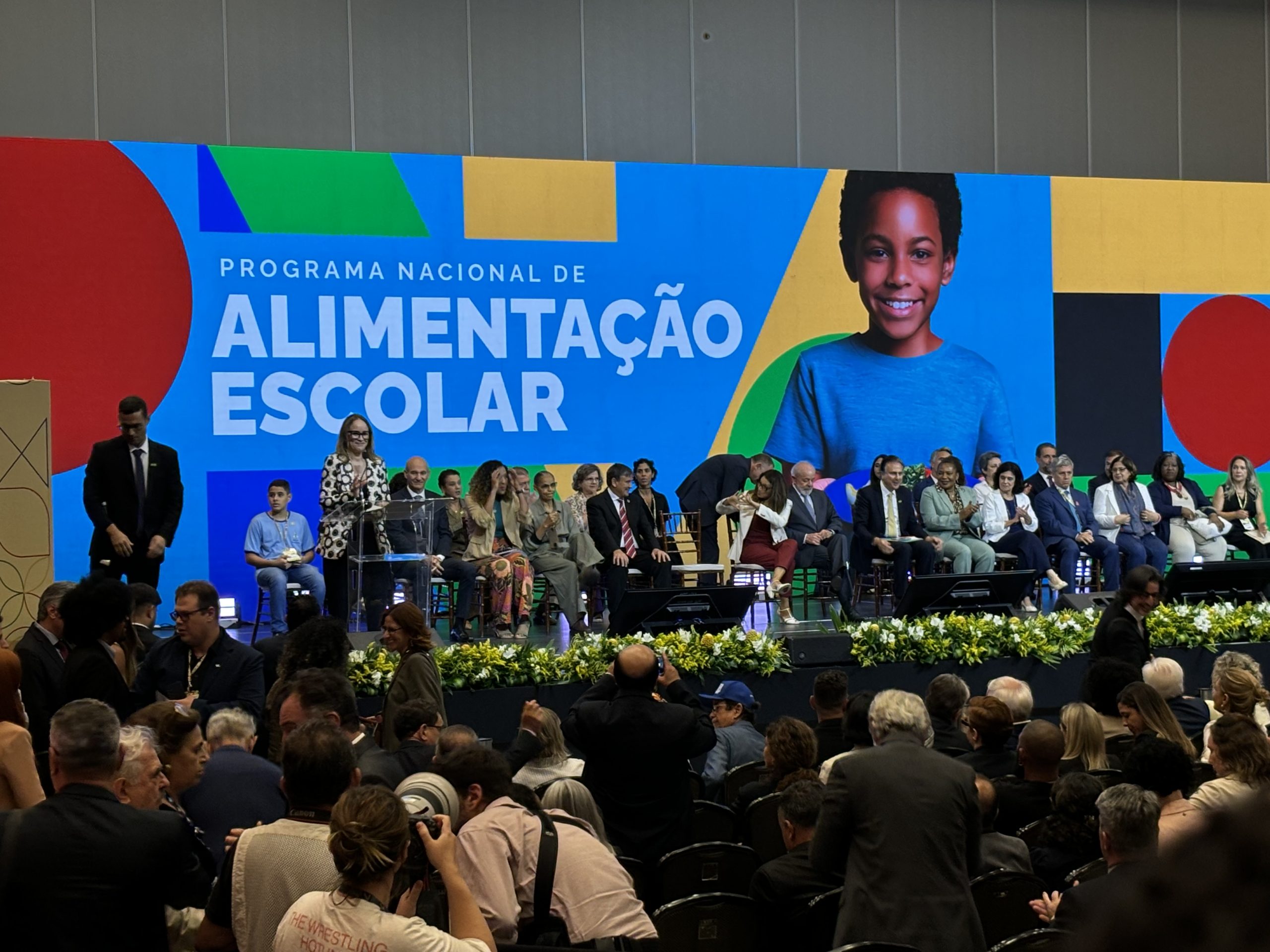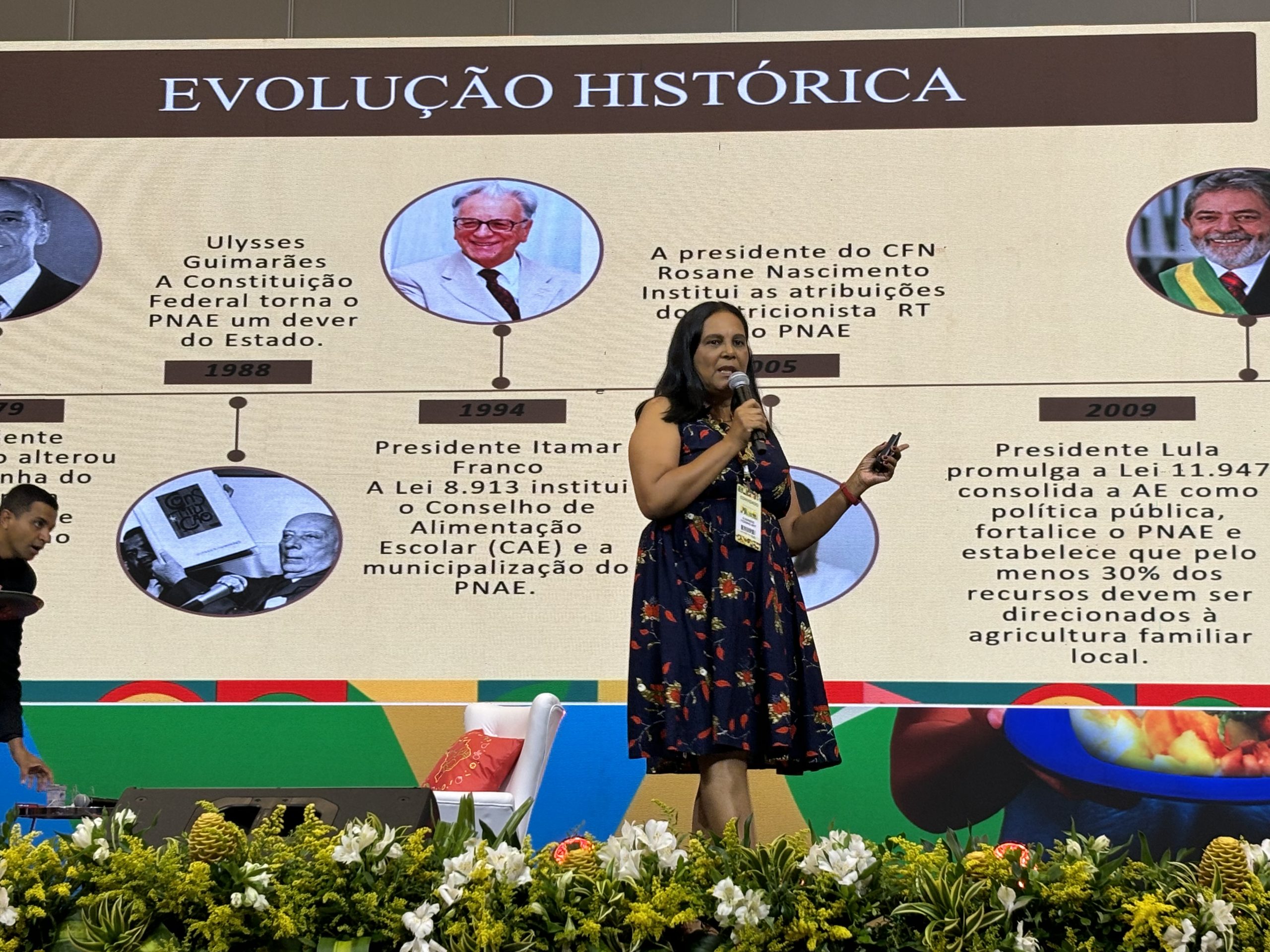
Around 1,500 nutritionists, school feeding councilors, education managers and specialists from all over Brazil took part in the 6th Meeting of the National School Feeding Programme (PNAE), which took place in Brasilia on 4 and 5 February. The opening ceremony was attended by the President of the Republic, Luiz Inácio Lula da Silva. The event announced a reduction in the limit of ultra-processed foods in school meals from 20 per cent to 15 per cent.
In addition to President Lula, the event was attended by First Lady Janja da Silva; several ministers of state, including the Minister of Education, Camilo Santana; the president of the National Education Development Fund (FNDE), Fernanda Pacobahyba; and the director of the WFP Centre of Excellence against Hunger in Brazil, Daniel Balaban.
In his speech at the opening of the event, President Lula emphasized the importance of investing in school meals. “Nobody can study on an empty stomach. Paulo Freire said that when you eat, you become intelligent, your brain has time to learn. That’s why we invest in school meals. There are 5.5 billion reais in investment, which is very little, to feed 40 million children in schools every day with nutritious and healthy food,” said the president.
For Fernanda Pacobabyba, the event is an opportunity to discuss Brazil’s school feeding policy, which considers aspects of each region of the country, and to consolidate the Brazilian model. ‘With the World Food Programme, our goal is even bolder: to ensure that more than 720 million students around the world can have at least one nutritious meal a day,’ she said.
Miguel Moura, 13, a pupil at the Sobradinho Primary School 3, made an emotional statement. “One very important thing for public school students is that we spend a lot of time at school. With the snacks that the lunch ladies make, it helps us to stay focused and concentrated when it comes to the activity and the teacher’s explanation. That’s why I’d like to thank all the school cooks in Brazil,” he said.
Panels and workshops
On the 5th, the event’s programme included a series of themed panels and workshops on different aspects of school feeding. The event opened on the second day with a presentation entitled ‘Towards a Brazilian school feeding policy’. Bela Gil gave a masterclass on the importance of school meals without ultra-processed foods.
Albaneide Peixinho, project coordinator at the Centre of Excellence against Hunger, and Karine Santos, general coordinator of the PNAE, kicked off the day’s series of talks on the theme “History, progress and prospects”.
Albaneide presented a timeline illustrating the evolution of school meals from the 1920s in São Paulo to the establishment of the PNAE in 1979, and its evolution to the present day. ‘Today we have school meals that respect the nutritional needs of each student; 30 per cent of school meals come from family farms; the subject of nutrition must be included in the school curriculum; and the model of participatory management and social control was created, which needs to be effectively implemented if all the stages are to function properly,’ she said.
Karine Santos, general coordinator of the PNAE, emphasized that the FNDE has networks in place to disseminate school feeding internationally. “We’re going to take the PNAE model to 106 countries in the School Feeding Coalition, at the Global Summit to be held on 18 and 19 September in Fortaleza. What you do here, we take to the world. That’s the scale of your work,” he said.

International cooperation
The director of the Centre of Excellence, Daniel Balaban, shared the panel ‘Building New International Networks and Promoting FNS in the Global Context’ with the FAO’s Project Coordinator, Najla Veloso, and the MRE’s General Coordinator for Food and Nutritional Security, Saulo Ceolin.
Balaban emphasized the importance of working in cooperation. “When we work together, we move forward. Thirteen years ago, only 18 countries had a school feeding programme. Today there are 170 countries, thanks to people who have dedicated themselves to international cooperation. Co-operation is much better than competition. Co-operation allows everyone to have access to instruments to develop,” he said.
Najla Veloso spoke about the history of the School Feeding Network in Brazil and Latin America and the Caribbean, and the Brazilian government’s commitment to systematizing and disseminating healthy food to all students around the world. “What we do here becomes good practice. We work bilaterally, in dialogue with networks in each country. From 2012 to 2022, more than a billion dollars will be invested in school feeding in the region,” she said.
Saulo Ceolin presented the Global Alliance against Hunger and Poverty, which today has 160 members and was created to support major national programmes to tackle the problem. “The Alliance connects countries with technical capacities to countries seeking to implement policies. One of the solutions in the fight against hunger is the creation of a national school feeding policy, an instrument for improving education, health, nutrition and strengthening local agriculture,” he said.
According to Ceolin, the PNAE is an example for countries that want to create their own programmes. “There is a huge demand from other countries for support in implementing their programmes. It’s important to note that our programme is also improved when we exchange with other countries. We strengthen our policy by sharing it,” he said.
Workshops
Alongside the panels, the Meeting held a series of workshops on topics such as Financing, Nutritional Aspects of the PNAE, Traditional Peoples and Communities, Food and Nutrition Education, Monitoring and Social Participation, and Family Farming
The Centre of Excellence’s Programme Assistant, Sineide Santos, moderated the workshop on Traditional Peoples and Communities. The results of the workshops were presented at the end of the day, with concrete suggestions for improving the Programme in each of the areas discussed.
Among the proposals put forward were: readjusting the Programme per capita; valuing the work of the school cook and nutritionist; promoting greater engagement by public authorities and managers; promoting training and expanding monitoring; setting up Collaborating Centres for School Food and Nutrition – CECANEs – in all the states; setting up pedagogical gardens; and, in traditional communities, carrying out research into local eating habits and empowering indigenous and quilombola leaders together with managers.




